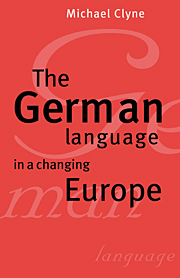Book contents
- Frontmatter
- Contents
- List of maps
- List of tables
- Acknowledgements
- Places mentioned in the text
- German, Dutch and Frisian dialects
- Introduction
- 1 The status of German in contemporary Europe
- 2 German as a pluricentric language
- 3 German in divided and unified Germany
- 4 Language and regionalism in Germany and Austria
- 5 Communication patterns
- 6 Gender, generation and politics – variation and change in language and discourse
- 7 Communication norms and communication barriers
- 8 Recent Anglo-American influence
- Closing remarks
- Glossary of linguistic terms used
- Bibliography
- Subject index
- Index of names
3 - German in divided and unified Germany
Published online by Cambridge University Press: 21 January 2010
- Frontmatter
- Contents
- List of maps
- List of tables
- Acknowledgements
- Places mentioned in the text
- German, Dutch and Frisian dialects
- Introduction
- 1 The status of German in contemporary Europe
- 2 German as a pluricentric language
- 3 German in divided and unified Germany
- 4 Language and regionalism in Germany and Austria
- 5 Communication patterns
- 6 Gender, generation and politics – variation and change in language and discourse
- 7 Communication norms and communication barriers
- 8 Recent Anglo-American influence
- Closing remarks
- Glossary of linguistic terms used
- Bibliography
- Subject index
- Index of names
Summary
The evolution of the national varieties of Standard German described in Chapter 2 took centuries of political and cultural development, sometimes more divergent, sometimes more convergent.The post-war division of Germany covered a period of forty-five years – four years when Germany was split into occupation zones and the forty-one years when the Federal Republic of Germany and the German Democratic Republic were separate entities. The division occurred after standardization in the German language was complete. In this chapter, I will discuss how the language differed in the GDR and the Federal Republic and particularly to what extent it has converged again.
Situation prior to 1989
The two Germanies had vastly different social and political systems, opposing political and economic alignments, and in many ways underwent separate cultural developments. This was reflected in the language, which at the same time contributed to variations in people's consciousness. During the time of division, the German language gave unique contrastive insights into the ideologies and approaches of the Eastern and Western Blocs. In the case of the two German states specifically, the Federal Republic paid a great deal of attention to coming to terms with the past (Vergangenheitsbewältigung) and to being seen to accept responsibility for the actions of the National Socialists. Nationalism was pushed from the ‘high’ culture to the ‘low’ culture of some groups, such as returned soldiers and refugees from the former German territories east of the Oder–Neiße Line. The GDR, on the other hand, declared itself an anti-fascist state because many of its leaders had been victims of National Socialism and this absolved all the GDR's inhabitants from their past actions.
- Type
- Chapter
- Information
- The German Language in a Changing Europe , pp. 66 - 88Publisher: Cambridge University PressPrint publication year: 1995



